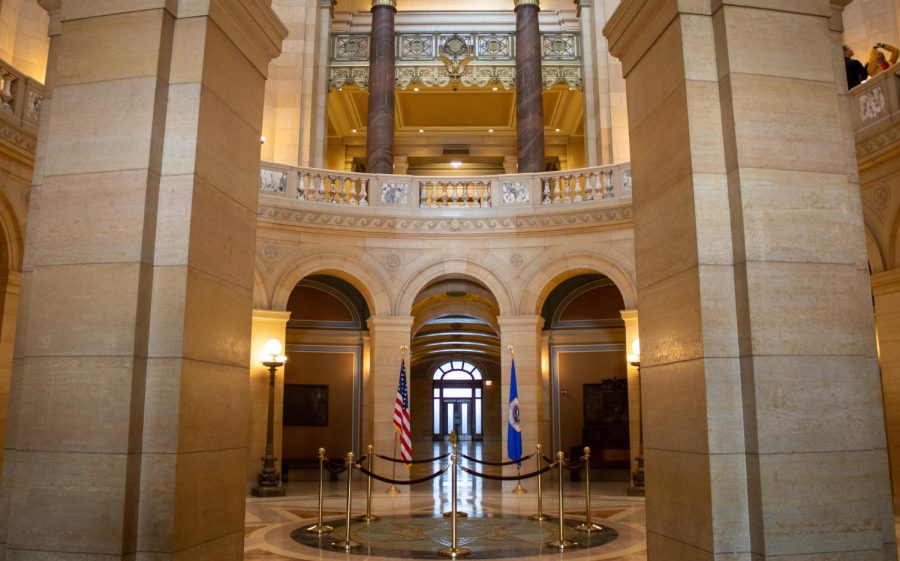Democratic lawmakers have aimed to use Minnesota’s trifecta to push previously stalled bills into law since the session began in January.
The 2022 midterm election results gave the Minnesota Democratic-Farmer-Labor (DFL) party control of all three branches of state government for the first time in nearly a decade, allowing Democratic policies to move forward without support from Republicans. Gov. Tim Walz said the DFL-led Legislature would focus on issues such as public safety, climate change and “defending the rights of individuals” in his acceptance speech for the 2022 election.
Although the DFL holds slim majorities in both the House and Senate, Democrats have seen early successes in advancing bills less than halfway into this year’s session.
The PRO Act codifies abortion access
The first bill introduced into the state Legislature was the Protect Reproductive Options (PRO) Act on Jan. 4, which Walz signed into law on Jan. 31.
The PRO Act guarantees reproductive rights such as health care privacy, access to contraceptives and access to abortions for all Minnesotans.
The bill protects reproductive health care as many states have begun to limit access to abortion, according to Emily Bisek, vice president of strategic communications for Planned Parenthood North Central States.
“To see legislators listen and take action so quickly, was just really inspiring and hopeful,” Bisek said. “With our rights, having a second layer of protection, we can let out a sigh of relief for the first time since Roe was overturned.”
The U.S. Supreme Court overturned Roe v. Wade in 2022, repealing federal protections for abortions and turning its accessibility into a state decision. Abortion is protected in Minnesota by the 1995 state Supreme Court decision Doe v. Gomez, but future judges could have overturned the ruling and repealed the state’s protections.
“No matter who sits on the Minnesota Supreme Court, this legislation will ensure Minnesotans have access to reproductive health care for generations to come,” Walz said in a press release. “Here in Minnesota, your access to reproductive health care and your freedom to make your own health care decisions are preserved and protected.”
Since the overturning of Roe, Planned Parenthood North Central States has seen a 40% increase in second trimester abortions, Bisek said.
Bisek said more people are seeking abortions later in pregnancy due to increasingly limited abortion accessibility and outside pressure for patients to continue their pregnancy.
Minnesota has become a sanctuary state for abortion health care, with patients coming to receive care from surrounding states that have banned or restricted abortion access like North Dakota, South Dakota, Wisconsin and Iowa.
Minnesota moves toward marijuana
A bill to legalize recreational marijuana use stalled under the state’s divided government in 2021. State Democrats are advancing a new bill to legalize recreational marijuana use in Minnesota.
The bill, introduced on Jan. 4, would allow anyone age 21 or older to recreationally use cannabis and possess up to two ounces of cannabis in public, five ounces in private and edibles with up to 800 milligrams of THC, a chemical found in cannabis.
Minnesota legalized medical marijuana in 2014 and legalized products containing small amounts of hemp-derived THC in 2022.
Zean Abdallah owns Campus Market & Tobacco in Dinkytown, which sells CBD and newly legalized hemp products. According to Abdallah, the bill would provide businesses an opportunity to begin selling new products.
“I would love to be able to give my customers some higher percentage, higher potency edibles,” Abdallah said. “I have a lot of stressed out college students and a lot of older people that work around the city. If I’m able to give my customers something a little better…that’s what excites me.”
Despite its progress, the bill still needs to pass through several legislative committees before it can be signed into law.
The required committee hearings are a result of the bill aiming to create new cannabis licenses for businesses, fund programs to fight cannabis addiction, create an 8% retail sales tax, eliminate criminal penalties for cannabis possession and expunge low-level cannabis criminal records.
Although marijuana may be legalized this year, Abdallah said customers will have to be patient because the process to apply and be approved for THC and tobacco licenses can take months.
“Especially when you’re doing something where products are prohibited under 21, the licensing is going to take a little more time, qualifications are going to take more time,” Abdallah said. “That’s just how it goes.”
Legislature hopes for ‘record-breaking productivity’
Walz signed several bills into law throughout January and February. The new laws include the Creating a Respectful and Open World for Natural Hair (CROWN) Act, a bill officially marking Juneteenth as a state holiday, a bill to establish a carbon-free standard and require 100% clean energy in Minnesota by 2040 and a bill to provide funding for the Attorney General’s office to hire seven more prosecutors.
Other bills are still moving through the state Legislature, including the Driver’s License for All bill, which would allow undocumented residents to obtain a driver’s license. The bill passed through the House on Jan. 30 and through the Senate on Wednesday; the bill will head back to the House with slight changes made in the Senate for final approval before being sent to Walz.
Lawmakers are looking to create “record-breaking productivity” before the session ends in May, according to Speaker of the House Melissa Hortman (DFL-Brooklyn Park).
Social policies are easier to advance earlier in sessions because they often do not require significant funding, Hortman said. Once budget forecasts are released near the beginning of March for Minnesota’s record $17.6 billion surplus, lawmakers’ focus will shift to projects that need funding, such as education and health care.
“Our highest priorities on the budget side are kind of in the background right now because we’re not in budget season,” Hortman said. “They’re about to move into the foreground.”








